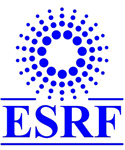About the Project
Ref: InnovaXN_8_ESRF
Categorisation:
Places of work :
- Grenoble, Rhône-Alpes, France
Contract type: Contract, start on 2020-09-07.
InnovaXN is a Horizon 2020 MSCA COFUND programme providing an opportunity for 40 industrial companies to work with 40 PhD students, performing advanced research and exploiting the unique characterisation techniques of the ESRF and ILL. Through collaborations with industry, innovation will be the central theme of the programme. This will provide a unique cross academic-industry science setting, secondment opportunities and society-relevant research, training the future key researchers able to tackle major research and societal challenges.
Project title: Molecular level understanding of cavity formation upon loading and unloading in cross-linked nanocomposites
You will join ID02's team at the ESRF. Beamline ID02 is a multipurpose high resolution SAXS/WAXS/USAXS instrument featuring a 34 m detector tube combined with state-of-the-art optics and detectors. The instrument is specialized for time-resolved investigations of soft matter and biophysical systems down to the submillisecond range by exploiting the coherence and brightness of the new ESRF source.
The aim of the PhD project is to understand nanocavitation upon loading and unloading in cross-linked nanocomposites (rubbers) on a molecular level by using in-situ scattering techniques. Cavity formation is the response of the material on localized high level stress which leads to irreversible breakage of polymer chains and in the end to a macroscopic crack propagation and deterioration of the material. Any heterogeneity (imperfection) in the material causes localized viscoelastic deformations and consequently a heterogeneous stress distribution. The novelty of the project will be to study how the phase morphology of different polymer blends (using different filler materials/dispersions and manufacturing conditions) affects the damage mechanisms (cavitation) in the bulk and around a crack tip.
Further information may be obtained from Dr. Michael Sztucki (tel.: +33 (0)4 76 88 28 93, email: [Email Address Removed]), from Dr. Ali Karimi (tel.: +49 (0)511 976-30787, email: [Email Address Removed]) and from Prof. Dr. Jorge Lacayo-Pineda (tel.: +49 (0)511 976-4523, email: [Email Address Removed])
- Degree allowing enrolment for a PhD in chemistry (such as MSc, Master 2 de Recherche, Laurea or equivalent) in chemistry or a closely related science.
- A background in experimentation is desirable, and knowledge of scattering techniques and polymer science would be an advantage
- Manual skills and rigorous attention to detail are essential in this work environment
- Proficiency in English (A proof of upper-intermediate level must be included in the application. Applicants originating from native-English-speaking countries can apply without the need for proof of level. An official degree conducted in English will be also accepted as a proof).
- Compliance with the Marie Sklodowska-Curie mobility rule: candidates may not have resided or carried out their main activity (work, studies, etc.) in France for more than twelve months in the three years immediately before the date of recruitment.
- At the date of recruitment, early-stage researchers must be in the first four years of their research careers and have not yet been awarded a doctoral degree.
- Candidates must satisfy the conditions for enrollment in a doctoral programme
More details about the application procedure on www.innovaxn.eu/for-students/documents/
The successful candidate will be enrolled in the doctoral school at University of Hannover (Germany) and based full-time at the ESRF (Grenoble, France), other than a 3-month secondment at Continental Reifen Deutschland GmbH (Hannover, Germany). Additional visits totaling no more than 3 months may be made to the University of Hannover when needed. Furthermore, a varied pedagogical training programme will be offered to the successful candidate throughout the 3-year PhD project.
More details on the InnovaXN programme on www.innovaxn.eu

 Continue with Facebook
Continue with Facebook

